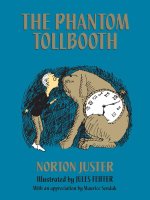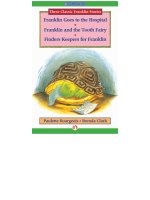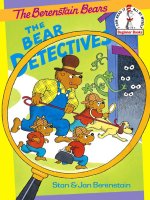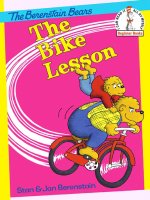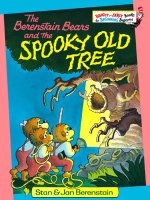Dan poblocki the stone child (v5 0)
Bạn đang xem bản rút gọn của tài liệu. Xem và tải ngay bản đầy đủ của tài liệu tại đây (745.01 KB, 140 trang )
For my mom and dad
1
The blue station wagon had just come around a sharp bend in the road when the
creature stepped out of the woods. Eddie was the rst to see it—a blur of black hair and
four long, thin legs. It looked at him with red-rimmed yellow eyes and a gaping mouth
full of sharp teeth.
“Watch out!” Eddie cried from the backseat.
His father smashed his foot against the brake pedal. The car began to shtail; the tires
squealed. Eddie felt himself jerk forward against the seat belt as several of the boxes
stacked on the backseat of the car tumbled onto the oor beside him. The book he had
been reading ew out of his hands and smacked against the seat in front of him. Eddie’s
mother clutched at the ceiling and let out a yelp. Then came the horrible crunch as the
front of the car crashed into the creature, sending it ying into the greenish darkness of
the woods. The right side of the car skidded o the road and shuddered over several
small shrubs, before lurching to a stop a few feet from a mossy boulder. Through the
windshield, Eddie watched steam hiss from underneath the car’s mangled hood.
“Is everyone all right?” asked Eddie’s father after several seconds of stunned silence.
Eddie had to think about that—his shoulder burned where the seat belt had caught him.
He felt like he’d had his breath knocked out of him—partly because of what he’d seen
step in front of the car. Its horrible face was lodged in his mind.
“I’m okay,” said Eddie’s mother.
“Me too,” Eddie managed to say.
“I’m so sorry,” said Eddie’s father. “I didn’t even see it coming.”
“Look at the front of the car,” said Eddie’s mother, removing her seat belt. “How could
a deer do so much damage?”
“Too big for a deer … I think it was a bear,” said Eddie’s father, leaning forward over
the steering wheel, peering into the trees where the animal had disappeared. He opened
his door.
The car sat at the top of an incline, hugging the curve of the wooded, winding road.
“Stay inside,” said Eddie suddenly. He was certain the thing had been neither a deer nor
a bear. His father looked at him like he was crazy. “Drive away,” Eddie insisted.
“I need to see the damage. The moving trucks are probably already waiting for us at
the new house.”
“Yeah, but—”
“Edgar Fennicks, don’t be ridiculous!” said Eddie’s mother. “It’s probably injured … or
dead. Your father hit it really hard.” His parents both got out of the car and closed their
doors, leaving him alone in the backseat. They marched to the front of the car and
examined the bumper. Eddie’s father threw his hands into the air in frustration. His
mother covered her mouth and turned away toward the woods. Eddie looked at the
woods too. The foliage was dense, but other than the wind rustling the branches, there
was no sign of movement in the area where the creature had landed.
Eddie didn’t want to be alone. Reluctantly, he opened his door and stepped into the
broken bushes.
It was the beginning of September, and the afternoon air was cool. From the top of
the hill, Eddie could see the slate-gray sky hanging over the rolling hills like a tattered
blanket. The only sound he heard was the wind through the trees. It sounded like
someone whispering a secret. Maybe the thing was dead after all. The thudding sound
the car had made when it hit the animal echoed in Eddie’s head, giving him chills. He
zipped up his blue hooded sweatshirt.
When he made it to the front of the car, he could see why his father was so upset. The
right side had been crushed. The headlight was embedded in the front tire. Tufts of black
hair were stuck to the crumpled metal. From the left side of the car, the bumper
protruded like a broken bone. “Whoa,” said Eddie. His parents merely shook their heads.
After a moment, Dad wandered back to the driver’s-side door, got in, and started the
car. “Watch it!” he called, shifting the gear into reverse. When he pressed the gas pedal,
the axle cried out in a loud, piercing whine. He shook his head, turned the car o again,
and grabbed his cell phone from the front seat.
As his father called the police, Eddie stood with his mother at the edge of the woods.
She whispered, “Don’t worry, Edgar. We’re almost home.”
“I’m not worried,” said Eddie, even though he was, a little bit. His ngertips tingled,
and the crunch of the metal resonated somewhere deep inside him. He would have been
worried even if they hadn’t just gotten into a car accident, but he gured it was normal
to feel that way on the day you were moving to a new town. Everything was uncertain.
After his mother had lost her office job in Heaverhill, she wanted a change of scenery. At
the end of the previous school year, Eddie had said goodbye to his old classmates
without knowing he might not see them again for a while. His parents had made the
decision to move quite quickly. He had no idea what his new house would look like, or
what his new classmates would be like. Eddie had been feeling pretty overwhelmed all
day—all month, in fact—and so on the car ride down from Heaverhill, he’d been
rereading one of his favorite books, The Revenge of the Nightmarys. Reading familiar
stories was comforting, even stories as scary as the ones Nathaniel Olmstead had
written. “Do you really think it’s dead? Because … it looked like …”
“Like what?” said Mom.
“Like … a monster,” said Eddie, “or … or something.”
“A monster?” Mom laughed. “I wish my imagination were half as wild as yours,
Edgar. I’d be a bestselling novelist by now.”
“Didn’t you see its face?” “I didn’t get a good look.”
“Hey,” called Eddie’s father, “the cops are on their way with a tow truck. The o cer I
spoke with said we should probably wait inside the car.”
“Why?” said Mom.
“I told him I hit a bear.”
“What did you tell him that for?”
“Because it’s true!”
“It wasn’t a bear. It didn’t look anything like a bear,” she said, stepping back toward
the car. “Edgar seems to think it was a monster. I swear, the two of you are such a
pair.”
Eddie was about to follow her back to the car, when something in the distance down
the road caught his eye, freezing him where he stood. Across the dip of the next valley,
where the road descended, Eddie noticed a simple box of a house sitting on top of a
grass-covered hill. A patchwork of tall trees, the leaves of which were turning in the
wind, surrounded the nearby hills. The smoky peaks of the Black Hood Mountains were
visible on the horizon. He knew he’d seen this place before, but where? A postcard? A
book? A dream? The familiarity of the sight was surreal enough to knock away the
image of the creature his father had struck with the car. He wandered to the faded
yellow line on the road for a better view.
A fat stone chimney, like an enormous gravestone, sprouted from the center of the
house’s pitched slate roof. Five small windows spread across the top oor. On the
bottom were four windows framing a broken door twisting away from its hinges.
Unpainted gray shingles peeled away from the sides of the house. Brush and bushes and
weeds obscured the rest of the building.
His mouth went dry as he gasped. “No way,” he whispered to himself, suddenly
realizing where he’d seen the house.
“Edgar, you are going to get hit by a truck!” his mother called out the window from
the passenger seat.
Eddie pointed at the hill. “But—”
“Come on,” said his father, leaning out the driver’s-side door. “Get in the car, bud.”
Eddie stumbled to the car and climbed into the backseat.
“What were you looking at?” Mom asked. “Did you hear something in the woods?
That thing’s not still alive, is it?”
He didn’t answer right away. Instead, he bent down and searched the oor for the
book he’d been reading during the ride from Heaverhill. The Revenge of the Nightmarys. It
was underneath his mother’s seat.
“Edgar, what’s wrong?” Mom said, peering at him from behind the blue vinyl
headrest.
He opened the book’s back cover and showed his parents the picture printed there.
The man on the inside ap of the book jacket stood in front of a country house on top of
a grassy hill. The windows were not broken. The weeds had not yet grown. The shingles
were gray, and though they were not in perfect condition, they were in much better
shape than the shingles on the house on the hill up the road. The fat stone chimney
looked more like a monument than a gravestone, but still the resemblance was
unmistakable. The man’s face was serious, but his ru ed brown hair and short beard
gave him the appearance of a kind, creative soul. Under his picture, a brief biography
explained that Nathaniel Olmstead lives in a small town in northwestern Massachusetts. He is
an amateur astronomer, an ancient history bu , and a fan of monster movies. When his
parents finished looking at the picture, they stared at him, confused.
“Look …” Eddie pointed down the road.
“Hey!” said Dad, finally noticing the house on the hill.
Eddie had read somewhere that it had been empty for close to thirteen years, but it
looked more like thirty.
“Isn’t that odd …?” said Mom.
“Is Gatesweed the town where Nathaniel Olmstead lived?” asked Eddie.
“I don’t know,” said Dad, distracted. “Who’s Nathaniel Olmstead?”
“Dad! He’s this guy!” Eddie pointed at the picture again. “He wrote all my favorite
books. The Revenge of the Nightmarys. The Wrath of the Wendigo. The Ghost in the Poet’s
Mansion. The Curse of the Gremlin’s Tongue. And tons more. Phantoms. Spirits. Creepy
stuff like that.”
“So that’s why you thought you saw a monster in the road,” said Mom, taking the book
from him and examining the cover.
Eddie blushed. “Maybe.”
“This Olmstead person couldn’t possibly still live in that house,” said Dad.
“Well, supposedly,” Eddie said, “he disappeared, like, thirteen years ago. No one
knows what happened to him, or whether he’s even still alive. But his books are really
popular. I’ve read all of them. At least twice.”
“So his house is empty?” said Mom, glancing through the trees.
“Certainly looks empty,” said Dad. “In that condition, who would live there?”
“I don’t know,” said Mom. “Possibly people stuck on this road come nightfall.”
“Very funny,” said Dad.
“Might be inspiring for someone who writes spooky stories,” Eddie suggested.
“Yeah,” said Dad, “if you don’t use water or electricity, you could get all the
inspiration you’d ever need.”
A police car came speeding around the corner in front of them. It screeched to a halt
next to Dad’s car, facing the opposite direction. A frazzled old man in a wrinkled
uniform sat behind the wheel. Long wisps of thin white hair struggled to hide his nearly
bald head. His pinched eyes glared at them through thick glasses. He rolled down his
window and motioned for Eddie’s father to do the same. “You folks all right?” he said.
“We are, but the car’s not,” said Dad. “You want to take a look at it?”
“Uh-uh.” The old man shook his head so hard his glasses went crooked. “Tow truck’s
comin’. He’ll take care of you.” He grabbed a clipboard from the passenger seat and
held it through the window. A sheet of paper was attached to it. Eddie’s father reached
out through his own window and took it from him. “Fill this out for your insurance
company. Drop it at the town hall when you get a chance.”
“Well …,” said Dad, ustered, “I suppose I could just ll it out and give it to you
now.”
The old man shook his head again. “Tow truck’ll be here soon. I can’t wait around. …
Got stu to do.” The police car shuddered as he put it into gear. Without saying
goodbye, he rolled up the window and jerked his car up the road into a fast k-turn.
When he had turned the police car around, he sped back down the hill.
Eddie’s parents stared at each other. “Could he have gotten out of here any faster?”
said Dad.
“Don’t worry about him,” said Mom, patting her husband’s arm. “Remember when we
came down for the house closing, honey? That nice woman we met in that pretty little
bookstore said Gatesweed was peppered with eccentric people. All part of the charm,
right?”
Through the windshield, Eddie watched the leaves in the forest ash white, their
undersides whipped into a frenzy by the breeze. The trees parted and the house on the
hill appeared again. It seemed to hold its breath, as if keeping a secret.
A few minutes later, a beat-up black tow truck rumbled into view behind the blue
station wagon. A young guy, who looked to be in his late twenties, hopped out and
sauntered up the road on the driver’s side. He was tall and skinny. His tight black
leather jacket was open, revealing a Metallica concert T-shirt. When he leaned toward
Dad’s open window, his scraggly black hair hung below his shoulders. Eddie could smell
him from the backseat—a mixture of lingering cigarette smoke and vanilla air freshener.
Eddie’s parents cringed. The driver raised an eyebrow and smiled. “So … what did you
hit?”
2
They all waited on the side of the road as the driver loaded the station wagon onto the
tow truck’s crane. Eddie’s father explained what happened. The driver, who had
introduced himself as Sam, listened, curious, nodding as Eddie’s father told him how odd
the police officer had been.
“Didn’t even o er you a ride back into town?” asked Sam, opening the truck’s
passenger door for them. “That’s Gatesweed for ya. Where you people from? Not around
here, I bet.”
Eddie thought the guy knew more than he was saying. He climbed into the truck and
perched uncomfortably across his mother’s and father’s laps. Sam got behind the wheel.
He turned the key, and the engine growled to life.
“We came down from Heaverhill,” said Eddie’s father. “Upstate New York. A few
hours north.”
“We’re supposed to be moving in today,” said Eddie’s mother.
“Wait one wicked second. …” Sam turned his entire body to look at her. “You’re
moving into Gatesweed?”
“Well, yeah,” said Mom, clutching her pocketbook to her chest. “Why?”
Sam sni ed and shook his head. “Nothing. It’s just that when it comes to this town,
most people move out, not in. My parents left when I was still in high school. I live
across the Rhodes River Bridge, east of here.”
“Parts of the town seem a little … deserted, sure,” said Mom, “but overall, it’s such a
pretty place. Don’t you think?”
Sam pulled onto the road. “Yeah. Right. Pretty.” He turned on the radio. Heavy metal
music rattled the broken speakers in the dashboard—the singer was screaming
something about blood. “So it was Gatesweed’s abundant beauty that lured you?” he
asked with a smirk.
Out the window, Eddie watched as they passed a crooked iron fence on the left side of
the road. Dead vines were wrapped around the rusty spikes, as if the woods were trying
to drag the fence down into the dirt.
“Actually,” said Dad, “that’s sort of exactly right. … We drove out a few months ago
for an antiques fair just north of the Black Hood Mountains, and my wife fell in love
with the area. I’m an antiques dealer. … We thought Gatesweed might be a great spot
for collecting new pieces. We started looking and almost immediately found a deal on a
beautiful house with a big barn in the backyard. … Figured, what the heck? Perfect spot
to store antiques. Perfect town for my wife to start writing again.”
“You’re a writer?” Sam asked Eddie’s mother.
“Sort of. I haven’t published anything yet,” she said. “Speaking of writers, why don’t
you ask about that house, Edgar?” Eddie could tell she was trying to change the subject.
He blushed, embarrassed that she was drawing attention to him. “My son wanted to
know if the house back there belongs to that author … Nathaniel Olmstead?”
Sam was silent for almost ve seconds. Finally, he answered. “Yeah, sure. It belongs
to him …,” he said, before correcting himself, “or it belonged to him.”
“Did you know him?” asked Dad.
“Not really. I saw him around every now and then when I was a kid,” said Sam.
“Quiet guy. If anyone knows what happened to him, they ain’t talking. A mystery. Like
something out of one of his books.” Sam glanced at Eddie. “I read them all when I was
your age. What are you, twelve?”
Eddie nodded.
“Yeah,” Sam continued, “me and my friends were obsessed. Every time a new book
came out, we would go around town looking for the places that Nathaniel Olmstead
wrote about. Freak each other out and stuff.”
“Wait,” said Eddie, sitting up straight, “he wrote about places in Gatesweed?”
“Hell, yeah. The Devil’s Tree on Mansion Street. The old church rectory. The wood
mill bridge. The statue of Dexter August in the town green. They’re all right here. His
inspiration, they say. Me and my friends would hang out in these places at night. The
cops used to bust us up. Said we were disturbing the peace … having too much fun. But
that was before my friend Jeremy …” He turned the wheel sharply as the road curved to
the right. He didn’t finish his sentence.
“Before your friend Jeremy what?” asked Eddie.
The driver sucked his teeth. “You’re an Olmstead fan. You must’ve heard the stories.”
“What stories?” said Mom.
Sam chuckled, but he did not sound amused. “The Olmstead Curse …” Olmstead Curse?
Eddie suspected that the words were supposed to scare him, but for some reason, he
felt intrigued. He’d just learned that he was moving into the town where his favorite
author had written all of his favorite books—and now this guy was talking about curses?
A strange, nervous warmth was growing in his stomach. The way the weird old
policeman had driven o and left them stranded suddenly seemed to make sense—the
man was frightened to get out of his car. Was that because of this curse? Eddie wanted
to tell Sam about the animal his father had hit, that it had looked like a monster, but he
had a feeling his parents didn’t want to hear any more about it.
Eddie shook his head.
“Oh, come on!” said Sam.
“No. I haven’t heard of it,” said Eddie.
“A curse?” said Eddie’s father. “You can’t be serious.”
Sam didn’t answer.
“What kind of curse is it?” Eddie’s mother tried.
“I think I’ve already done enough damage to Gatesweed’s reputation for one
afternoon,” said Sam. “I do sort of depend on this town for business. Can’t go scaring
you o , especially now that you live here. If you want to know more, you can look it up
for yourself.”
“You can’t say something like that and then just leave it,” said Eddie’s mother,
clutching her pocketbook even closer.
The truck came around a bend in the road. Several sharp-peaked roofs bit through the
treetops ahead. Then, suddenly, the whole town appeared, cupped in the small circular
valley beyond the lip of the hill.
“I’d o er to check under your bed tonight for ya,” said Sam, turning up the radio, “but
I don’t want to intrude.” The music shrieked and the windows of the small cab trembled.
“Don’t you just love this song?”
Sam took a right onto Heights Road. The truck rose up the steep hill, shuddering as it
tried to shift gears. Eddie couldn’t believe they were almost home. So much was
happening so quickly.
Every house they passed might be the one where they would stop. Strange how so
many of them looked empty. Their windows were dark, the glass broken. Most of the
large front lawns were unkempt and overgrown, as if no one had touched them in
years. As unbelievable as it seemed, maybe the driver had been right. Maybe everyone
really had left Gatesweed.
Were curses real? Eddie wondered.
The long truck he had last seen in Heaverhill was parked in front of a quaint gray
house at the top of the road. When the tow truck stopped, his father opened the door,
and Eddie leapt from the cab onto the curb. He started to run up the driveway. He was
nearly at the garage when he heard his father call, “Edgar!”
Eddie turned around and called back, “I need to find my books!”
3
Ronald could see his re ection on the lake’s surface. The cold air bit through his thin jacket. Time was running
out. He looked at the crumpled paper. It was di cult for him to read the writing. The moon had almost sunk
beneath the horizon, and the light was fading. He needed to solve the riddle before the caretaker realized he’d
torn the page from the mysterious book.
Ronald squinted to make out the position of the cross marks on the paper. He knew that the rst X was the
mansion itself, and he was pretty sure that the second X represented the statue of the girl in the clearing. But
what location did the star represent? There were certainly plenty of stars re ected in the water, but which one
held the answer to the question at the top of the page?
As he looked at the other shore, trying to notice another clue, the toes of his sneakers slipped forward and
touched the wet, muddy edge of the lake, sending out tiny ripples. He immediately leapt backward. His
grandfather had warned him—no matter what, do not touch the water.
Re ected in the water, some of the stars had already changed color, from white to red. As he watched, they
all turned, then began to move. In an instant, they divided into hundreds of pairs of red eyes that watched him
from under the lake’s surface.
Ronald took a step backward and almost tripped as he turned to run. He made it to the woods before he
heard the splashing.
“Here you are,” said Mom.
Eddie sat on the dusty oor of the barn, surrounded by piles of boxes. Ronald
Plimpton’s story lingered in his mind’s eye like smoke. Even after seeing his mother
standing in the doorway, it still took him a moment to realize where he was. The orange
overhead light bounced o the rafters above. The pitched roof of the barn was hidden in
shadow. Outside, it was starting to get dark.
“I was looking all over for you,” she said. “I’m gonna make dinner. Your father called.
He’ll be back from the garage in a few minutes. They gave him a loaner so he can drive
himself home. … What are you doing in here?”
Once the movers had nished unloading the truck late that afternoon, Eddie had torn
into the boxes they’d stacked in the barn. After seeing Nathaniel Olmstead’s house on
the hill and learning about the supposed curse from the tow truck driver, all Eddie had
wanted to do was nd his collection of books. Of course he’d read them all before, but,
for a reason he couldn’t quite name, Eddie needed to have them now. He wished he’d
been more organized when he’d packed in Heaverhill. He’d forgotten to label some of
his bedroom boxes. The movers had placed them in the barn with his father’s antiques.
Eddie showed his mother the rst book he’d found, the one he’d been reading when
she’d interrupted. The Rumor of the Haunted Nunnery.
She pursed her lips. “Have you started on your bedroom at all? It’s getting late.”
Eddie shook his head. He couldn’t concentrate on unpacking yet. This book had
captured him again.
Mom had changed into a T-shirt and sweatpants to make the work of unpacking boxes
more comfortable. It had been a long day. Leaning against the wooden door frame, she
looked exhausted. “School starts the day after tomorrow, you know. You’re not gonna
have much more time to get organized before homework sets in.” She suddenly looked
closer at the book in his hands. “Hey, isn’t that by—”
“Nathaniel Olmstead,” said Eddie. “Ronald was about to run away from the monster
lake-dogs.”
“The monster lake-dogs?” said Mom. “Sounds scary.”
“Once he makes it back to the mansion, he feeds them leftover chicken bones and
escapes, so it all turns out okay,” said Eddie.
“I never realized that leftover chicken bones worked so well at getting rid of monster
lake-dogs.”
“They’re easily distracted,” said Eddie, shrugging. “If you read the book, you’d know.”
“Maybe I should read those books,” said Mom. “I mean, if this town is cursed, I
probably need to prepare myself.” She rolled her eyes. “Can you believe that guy from
the garage?” she said. “I was nervous to leave your father alone with him. Creepy.”
Eddie laughed. “I thought he was sort of cool.”
“Cool?” said Mom. “If serial killers are cool, then sure, that guy was very cool. Come
on, let’s go inside. You can help me find the pots and pans.”
“But I wanted to find my books. They’re all mixed up out here.”
Mom sighed, glancing around at the mess. She nudged an open box with the toe of her
boot. “Here … what about this one?” She reached inside and pulled out a leather-bound
book. She tossed it to Eddie. He was surprised when he actually caught it.
Eddie had never seen it before. It was unlike the well-worn paperbacks for which he’d
been searching.
The cover of the book was sturdy. The leather was tight but slightly worn around the
edges. From the side, Eddie could see that the book was not thick, maybe 150 slightly
yellowed pages. The gold lettering stamped directly onto the brown leather read The
Enigmatic Manuscript. Despite its size, the book was heavy. When Eddie lifted the cover,
it creaked, snapping at him as the old glue bent. Inside, Eddie found words scrawled in
black ink in the center of the rst page. When he read them, he gasped. A story by
Nathaniel Olmstead.
Underneath the author’s name was a strange symbol.
Eddie didn’t know what it was supposed to mean. “The Enigmatic Manuscript? What is
this?” he said.
“Isn’t it one of your books?” said Mom.
Shaking his head, Eddie held it open and showed it to her.
Realization washed across her face. “Oh,” she said, “I remember now. … I picked up
that book when your father and I came down for the Black Hood Antiques Fair a few
months ago. I thought it looked interesting, like an old-fashioned artifact. We didn’t
know what it was, but your father thought it might be worth something. Isn’t it odd
Nathaniel Olmstead’s name keeps coming up today?”
Odd is an understatement, Eddie thought. He suddenly felt as if this entire day could
have been written by the missing author himself. A piece of the man seemed to be
everywhere Eddie looked.
But the author’s name on the rst page was nothing compared to what was on the
next page.
Eddie nearly dropped the book on the floor when he read:
VSP IYU POY PLY LDG UDM HUV HFP
WYF SYZ GYP FMG YHS PIY ZDU YFS
GDM RSF SYO DDG RPF YHK YYO VHD
LFS YIY GRY DTZ PFP HFG DAS YPL OVG
YPN VCY LDK FSP FVF VHU ETP MNF
Puzzled, Eddie ipped through all of the pages. He found the rest of the book to be the
same: lled with three-letter, nonsense words. He showed the book to his mother. “What
does it mean? Is it a sort of code or something?”
“Whatever it is,” said Mom, heading back toward the house, “you’ve got a day to
figure it out before school starts.”
“Do you think Dad will mind if I hang on to it?”
“We’ll ask him at dinner. If you do gure out what it means, he’ll probably thank you.
Especially if it did belong to this Olmstead person. Maybe it actually is worth
something.”
“Wow!” said Eddie. “This is so cool! Thanks!”
After dinner, Eddie’s mother came upstairs to say good night. She kissed his cheek while
he sat at his desk. “I’m going to try to write a little bit tonight, before I totally crash into
pieces,” she said. “I know it’s been a long day, but try to organize your room before bed.
Okay?”
“I’ll try,” Eddie said as she closed the door. “Good night.”
Like the rest of the quaint bungalow, Eddie’s new bedroom on the second oor was a
mess. Empty boxes, crumpled pieces of newspaper, and piles of clothes littered the oor,
a mess he’d managed to make since coming in from the barn. Much of the room lay
beneath the tilt of the roof, but there was still plenty of space to stand. A gabled
window with a southern view over the town cut into the sloping ceiling. The sun had
set, and the sky was indigo.
Eddie picked up the book his mother had found in the barn. It smelled awful, like dirt
or mold. Weird. He opened to the rst page again. The strange symbol leapt out at him.
Eddie placed the book onto his quilt and scrambled under his covers.
He reached out and ran his index nger down the spine of the book, feeling the
impression of the title stamped vertically onto the cover. A story by Nathaniel Olmstead?
What if The Enigmatic Manuscript was in fact a handwritten Olmstead book? A new
novel that no one had read before? It was possible. After all, his parents had found the
book only a few towns away. Nathaniel Olmstead’s name on the rst page might
actually be his signature! But if it was an unpublished novel, why would he have written
it in a code language? Whatever the reason, Eddie was certain that there was something
inside the book its author hadn’t wanted anyone to know.
Eddie stared at the ceiling, his shoulder throbbing faintly where the seat belt had
caught him. It had been such a weird day. Leaving his old house behind and driving
from Heaver-hill would have been unusual enough, but then his father had to go and hit
that creature in the road.
Its gash of a mouth lolled open when Eddie shut his eyes for a moment. He shuddered
and sat up, propping his pillows against his headboard.
After the accident, seeing the author’s house and learning about the supposed
Olmstead Curse only added to the day’s peculiarity. Eddie knew that every town has its
legends, but before he’d even had a chance to look around Gatesweed, it seemed as
though, in a way, the spirit of Nathaniel Olmstead had come to haunt him. The funny
thing was, Eddie didn’t mind. Figuring out the book would be like exploring Nathaniel
Olmstead’s world, almost as if he were a character inside one of his stories. Plus, Sam
had mentioned that Olmstead wrote about places in Gatesweed. Living here, Eddie could
explore his world from the outside too!
Like the characters in Nathaniel Olmstead’s books, Eddie had several questions: What
exactly is the Olmstead Curse? Why do people move out of Gatesweed but not in? What
exactly had happened to Jeremy, Sam’s childhood friend?
This last question left Eddie feeling queasy instead of excited, the way he felt about
the others. Strangely, this third question was the one he was most afraid of answering.
Where should he begin?
Eddie looked down at the book in his lap.
I n The Rumor of the Haunted Nunnery, Ronald found the key to decode a secret
message. The message allowed Ronald to nd the lake in the woods. Eddie knew
Nathaniel Olmstead liked to include codes in his books. Could the writing in The
Enigmatic Manuscript be one of those codes? If the town library had books about secret
codes, maybe Eddie wouldn’t need to nd a key, like the one Ronald had discovered.
Maybe Eddie could solve the code himself.
Shouldn’t be too hard, he thought. After reading all of Nathaniel Olmstead’s books
several times, he’d become pretty good at guring out stu like this. One more day until
school? Plenty of time, he thought with a smile.
4
After breakfast the next morning, Eddie begged his parents to let him explore the town.
They agreed, but only after he had organized his closet, bureau, and desk. They also
made him promise to be home for lunch.
Less than an hour later, he was out the door.
It was warm now that the sun had nally come out from behind the clouds. He didn’t
even need his hooded sweatshirt. Inside his backpack, he carried the two Olmstead
books that weren’t still packed away, as well as The Enigmatic Manuscript.
Standing next to his bike in the middle of his house’s gravel driveway, Eddie had a
perfect view of the town. The roads were laid out in concentric circles, linked by lanes
and small side streets, like a labyrinth. A long, thin park divided the town in half. On
the western end of the park, at the base of the surrounding hills, sat an old wooden
church, and on the east, along the Black Ribbon River, huddled several mills.
He wished he’d been able to nd the rest of his books the night before. He thought
they might act as a map for his journey. Even though he could probably list certain
places for which he should keep a lookout, like the ones Sam had mentioned yesterday,
Eddie gured there must be hundreds of secret Gatesweed spots he’d never on his own
think to look for. Then again, Eddie knew he had all the time in the world to explore
Gatesweed. Right now, however, he had a mystery to solve.
The library had to be down there somewhere.
Heights Road wound down to the town center. Eddie’s bike kicked up clouds of dust.
Before he realized what he was doing, he’d sped by several empty houses, a few deserted
storefronts, and a brick fortresslike town hall. He braked in front of the park, where the
long grass rustled in the warm breeze. He was on Center Street. True to its name, it
circled the center of the park and came back to the spot where Eddie stood.
Eddie glanced behind him, where an old movie theater sat quietly, the front of it
blockaded haphazardly by a loose chain-link fence. When Eddie noticed the marquee
over the entrance to the building, his skin went cold. He expected to see an old movie
title hanging on the yellowed white panel, but instead, broken black letters spelled out
strange words that reminded Eddie of the code from The Enigmatic Manuscript.
LO ED UN L FU HER NO ICE.
As he stared at the theater, Eddie realized he was wrong. The words were not part of
any code—some of their letters were missing. Feeling like a contestant on a weird game
show, Eddie slowly filled in the gaps.
CLOSED UNTIL FURTHER NOTICE.
The sign had fallen apart over time. Eddie suddenly felt entirely alone. The town
seemed to be deserted.
Across from the park stood a wide brick building covered in ivy. Stone steps led up to
a high arch, over which was carved GATESWEED PUBLIC LIBRARY. Near the roof, around the top of
the cornice, more words decorated the building. A PLACE WHERE STORIES ARE TOLD. Eddie beamed.
Eddie had never had tons of friends. In Heaverhill, the kids didn’t understand stu
like studying astrological star signs, or reading about old Babylonian statues, or
researching ancient Aztec gods at the library. People in Heaverhill tended to ignore the
way things could be or might have been, and so they tended to ignore Eddie. His mom
was always trying to get him to talk to people. Once, she’d signed him up for baseball
and soccer and karate. But Eddie only learned that he wasn’t very good at hitting or
kicking. Plus, there was never very much talking involved. So Eddie had found friends in
books. Nathaniel Olmstead’s stories were so vivid and strange, it was as if they had been
plucked directly from Eddie’s own brain. Maybe here, he thought, people would
understand what that felt like.
He locked his bike to the stand and made his way up the stairs. When he pulled hard
on the heavy glass door, the scent of old books wafted out. Eddie took a deep breath and
stepped inside.
In the center of the main room, two shallow balconies stretched from wall to wall,
fenced in by intricate wrought-iron railings. Tall shelves lined up vertically like teeth,
running along the entire length of each oor. The books were a sight to behold—their
spines were a jumbled mishmash of di erent sizes and colors. Some were new, but most
were dusty, musty, and worn. Spiral staircases wound their way up through each oor.
Though much of the room was cast in shadow, a skylight allowed the sun to spill down
to the main level where Eddie stood. He gaped up at the beauty of the place and didn’t
realize his mouth was open until he heard a voice ask, “Can I help you?”
The librarian sat behind a large wooden desk. A name-plate on top of the desk said
MRS. SINGH, ASSOCIATE LIBRARIAN. Her hair was wavy and dark, and her happy face was round.
She smiled at Eddie, so he smiled back. Sometimes, book people were easier to talk to.
“Hi,” he said. “I’m looking for a book about solving puzzles.”
“Crossword puzzles?” she asked.
“No. Puzzles written in code.”
“What kind of code?”
Eddie thought about that. “Like … this,” he said, reaching into his bag and pulling out
the book his mother had found the night before. He opened it to the middle and handed
the book to her.
The librarian ipped through the pages. When she happened upon the rst page, she
glanced at him, squinting with what looked like concern. “Where did you get this?” said
Mrs. Singh quietly.
“My mom gave it to me,” said Eddie, suddenly unsure of himself. “Do you know what
it means?”
The librarian’s face turned red. “Of course I don’t know what it means,” she said, too
forcefully. “Why would I know what it means?”
“I just thought …,” he said. He cleared his throat, trying to compose himself. Maybe it
wasn’t so easy to talk to book people, after all. “Can you recommend a book that might
help?”
“No, actually,” she said suddenly. “I’m quite busy, and the library closes at noon
today.” She turned her back on him and started typing something at the computer on
the table behind her.
Eddie’s face burned. Her attitude toward him had changed when she saw the rst
page. He wondered if the symbol written there had upset her? Or had it been Nathaniel
Olmstead’s name that sparked her irritation? Eddie decided not to ask. Instead, he
quietly made his way to a cluster of computers near the back spiral staircase.
Pulling up the library’s online catalog, Eddie suddenly had an idea. Since his own
Nathaniel Olmstead books were packed away, it might be worth checking out a few
from here—just to acquaint (or reacquaint) himself with some of the town’s locations.
When he typed the author’s name, a message appeared: WE DID NOT FIND RESULTS
FOR “NATHANIEL OLMSTEAD.” Confused, Eddie checked his spelling and entered the
name again. But he received the same message. No results? How could that be? He
glanced at the librarian at the front desk.
She was watching him.
When she saw him looking at her, she inched and turned back to her computer.
Eddie shivered. The librarian must not be a fan of Nathaniel Olmstead.
Eddie understood that some people didn’t think Olmstead’s books were very good,
that they weren’t considered literature. Still, it seemed odd that the man’s hometown
library wouldn’t carry his own books, even if there was supposed to be an—
Olmstead Curse …
The tow truck driver’s words echoed in Eddie’s head. He closed his eyes and took a
deep breath. Don’t be silly, he told himself. It’s only a story, right?
After searching the catalog for books about codes, Eddie climbed the stairs to the
second oor and wandered into a row of shelves hidden in shadow. Even in the dim
light, he managed to nd The History of Cryptography. At least this should get me started,
he thought.
Eddie headed back downstairs and reluctantly approached the front desk, where Mrs.
Singh pretended to ignore him. After a few seconds, he said, “I’d like to check out this
book, please.”
Finally, she turned around with a hu and a sigh. “Your library card?” she said,
holding out her hand to him. She waved her fingers impatiently.
“I … don’t have one.”
“Mmm-hmm,” said Mrs. Singh. Eddie almost expected her to tell him that they were
not issuing any new cards, but she reached under her desk, pulled out a piece of paper
and a pencil, and handed them to him. Without looking at him, she said, “Fill this out.”
Eddie wrote down his new address and phone number and handed the paper back to
Mrs. Singh.
“You’re new in town?” she said curiously. Eddie merely nodded. As she turned around,
she began to chew on her lip.
While he waited for her to process his new card, he ipped through the heavy book. It
was lled with all sorts of confusing language—almost as weird as that of The Enigmatic
Manuscript. Strange words like cipher, algorithm, scytale, skipjack, and cryptanalysis
jumped off the page. There was so much stuff shoved between the covers, he wasn’t even
sure if he would be able to understand everything.
“Here you go,” said Mrs. Singh. She handed him a small peach-colored paper card on
which was printed Gatesweed Public Library, a place where stories are told.
“Thank you,” he said, as politely as possible. Eddie shoved the book in his bag, hiked
it onto his shoulders, and struggled to open the library door.
Once outside, Eddie could not deny that it was a lovely day. Puffy clouds hovered over
the hills, and a warm breeze skirted around the corner of the library. When Eddie
unlocked his bike, he decided to ride over to the park and ip through his new library
book. He crossed Center Street and followed the path through the middle of the town
green. Like the rest of the town, the park was strangely deserted. There were several
benches planted randomly in the grass. Eddie hopped o his bike and was about to nd
a place to sit when he heard an odd whispering sound from across the lawn.
The sound came from the direction of a bronze bust perched on top of a rectangular
marble pedestal. The gray slab stood in the center of an old granite circle. Dandelions
lled wide spaces where the slate had cracked over time. A plaque was attached to the
front of the pedestal, but from where he stood, Eddie couldn’t read what it said. He
rested his bike on the sidewalk and trampled across the tall grass.
When he got closer, Eddie could see that the face of the bust had been destroyed, as if
by a large blunt instrument. The nose had been mashed at. Where its eyes should have
been were two dark holes. Its lips were mangled into a permanent gaping howl. As he
got even closer, the whispering sound grew louder.
Whist-whist-whist-whist-whist-whist.
It almost seemed as though the head was trying to speak to him through its distorted
mouth. Eddie’s hands went numb. He clutched the straps of his book bag against his
shoulders. The pungent smell of bleach lled the air. How strange, he thought. Then,
from the edge of the stone circle, he realized he could nally read the plaque: DEXTER
AUGUST, 1717-1779.
Sam had mentioned this place. Eddie had actually found one of Olmstead’s
inspirations! Nathaniel Olmstead had written about the bust of Dexter August in The
Ghost in the Poet’s Mansion. It wasn’t quite how Eddie had pictured it when he’d read the
book; in Nathaniel Olmstead’s version, Mr. August’s face had not been vandalized.
The sound of something splashing came from the other side of the statue, startling
Eddie. He stumbled off the edge of the granite circle.
A second later, he noticed a face peering at him from around the marble base. Before
he could see it clearly, the face disappeared and the whispering sound began again.
“Hello?” he said, trying to keep his voice from shaking. Keeping his distance from the
bust, Eddie made his way to the other side.
A skinny man dressed in a wrinkly blue uniform knelt in the center of the granite
circle. He scrubbed at the marble pedestal with a heavy wood brush. Whist-whist-whistwhist-whist-whist. Beside him sat a squat red metal bucket. After a moment, Eddie realized
the man was the same police o cer who had abandoned his family on Black Ribbon
Road yesterday.
Eddie could hear the man muttering when he noticed what the police o cer was
scrubbing at. Someone had sprayed black paint in the primitive shape of a face onto the
back of the pedestal. Two black squiggles for eyes dripped down the stone where the
paint had been sprayed on thick. Below the eyes, one blunt, almost straight line grinned
grimly. On the ground, behind where the police o cer knelt, Eddie noticed more
gra ti, huge words painted directly onto the broken granite. THE WOMAN IS
WATCHING.
Eddie hiked his bag higher onto his shoulder. The woman is watching? What woman?
Who is she watching? He glanced at the library, where the glass doors stared at him
darkly. He wondered if Mrs. Singh was watching him from behind her desk.
Finally, the man looked at him, holding up his hand to block the sun’s glare. He
scowled. “It’s not coming off this time.”
This time? Had someone done this before? Eddie wondered. “I’m sorry,” he said,
feeling for some reason as if the officer blamed him.
“Oh, it’s you,” said the man, suddenly recognizing him. Eddie expected him to nish
with You made it home all right, or Sorry I couldn’t be of more help yesterday, or at the very
least, You lived! But the man simply stared at him expectantly, as if he anticipated Eddie
to sprout wings and fly away.
The man’s silence made him feel weird. “I, uh … I’ll let you get back to work,” Eddie
said, stepping into the grass, heading toward his bike. The police o cer continued to
stare at him as he walked away. Eventually, the whispering sound began again as the
man went back to scrubbing at the black paint. Whist-whist-whist.
Eddie began to run. When he reached the sidewalk where his bike lay, he noticed
something painted onto the window of a store on the other side of the park.
BOOKS.
This time, the paint was not graffiti.
Even though he was sort of freaked out, Eddie couldn’t resist. His mother had
mentioned a bookstore in Gatesweed. This must be it. A bookstore was always cozier
than a library—more comforting—a familiar place in an unfamiliar town. He picked up
his bike from the sidewalk. Keeping far away from the weird cop, he walked his bike
across the grass and crossed the street.
The bookstore was in the lower portion of a two-story white wooden house, the last in
a row of buildings that curved along the park. A green-and-white-striped awning
reached out toward Eddie, shading the house’s porch from the sunlight. Glancing over
his shoulder toward the park, Eddie noticed the cop staring but decided to ignore him.
He crept up the stairs and pressed his nose to the window of the store, holding up his
hands to block out the glare. Dim lights hung from the ceiling, and bookshelves stretched
up so high that tall ladders leaned against them in several spots. The store looked
empty.
“We’re not open,” said a voice behind him.
Eddie spun around to see a blond-haired boy who’d spent too much of the summer
exposed to the sun. The skin on the boy’s nose was peeling. Eddie thought he smelled
like insect repellent. Eddie stood there with his mouth open, barely able to breathe. Why
was it that he could approach an adult librarian without a problem, but when facing the
possibility of conversation with someone his own age, Eddie’s brain shut tight?
“What do you want?” said the boy.
“Nuh,” said Eddie, turning sunburn red. He’d meant to say Nothing, but was only able
to spit out the first part of the word.
The boy examined Eddie quizzically before reaching around and opening the door.
Cool air breezed out. Eddie was about to ask what time he should come back when the
boy brushed past Eddie, closed the door, and locked it.
Embarrassed, Eddie almost turned to leave when the window display caught his
attention. He came closer to the glass to make sure his eyes weren’t fooling him.
Sitting on the table near the window ledge was a small display of Nathaniel
Olmstead’s books. A hand-painted sign propped up on the table read GATESWEED’S VERY OWN.
The books were stacked precisely in several piles. The Ghost in the Poet’s Mansion. The
Revenge of the Nightmarys. The Cat, the Quill, and the Candle. The Wrath of the Wendigo.
They were all there; however, these were not the books that caught Eddie’s attention.
At the far edge of the table sat a small stack of leather-bound books that had a
different title.
The Enigmatic Manuscript.
Eddie dropped his book bag onto the porch. Bending over, he opened the bag’s front
pocket and pulled out the book his mother had found the night before. Holding it up,
Eddie compared it to the books sitting on the table. They seemed to be exactly the same.
Would the inside of the books be the same too? Eddie felt his heart pumping. He could
see the blond boy moving around near the back of the store. Eddie took a deep breath,
realizing what he must do. The characters in Nathaniel Olmstead’s books never solved
any of their mysteries without taking a risk or two.
Before he could think to stop himself, Eddie knocked on the window. When the blond
boy peered around the corner of a bookshelf, Eddie waved and forced himself to smile.
“We’re closed!” shouted the boy before ducking away. His words hit Eddie in the chest
like a fast, hard baseball. This wasn’t going to be easy. Maybe he should leave. But no,
he told himself. Ronald Plimpton would not have given up so easily.
He raised his hand again and continued to knock. He didn’t stop until the blond boy
had come all the way to the front of the store. Angrily, the boy shouted through the
door, “What is wrong with you?”
“I—I wanted to ask you something,” Eddie stammered.
“Yeah …?” said the boy, looking as if he were about to walk away. His voice sounded
muffled through the glass.
“I wanted to know about that book on the table in the window. The Enigmatic
Manuscript.“
“What about it?”
“I was wondering if you knew when Nathaniel Olmstead wrote it?”
The boy made a face like Eddie was crazy. “Wrote it?”
“Yeah,” said Eddie. “What year did the book come out?”
“Nathaniel Olmstead didn’t write a book called The Enigmatic Manuscript. Nobody
wrote The Enigmatic Manuscript.“
Eddie shook his head, confused. The blond boy rolled his eyes, grabbed one of the
books o the pile of Enigmatic Manuscripts, and opened it to a page in the middle. He
held the book up to the window for Eddie to see.
“Blank,” said the boy.
Eddie still didn’t understand.
“The Enigmatic Manuscript is the name of my mother’s store!” said the boy.
“The name of your mother’s store?” said Eddie. He looked over his shoulder. The
store’s hanging placard sign stuck out from the pole at the top of the stairs, but it hung
perpendicular to the street, so it was really only visible from either side of the stairs.
“We sell souvenir blank notebooks,” the boy continued. “If you wanna buy one …”
The boy spun around and started back toward the bookshelves. Over his shoulder, he
called, “Then come back some other time.”
“Wait!” cried Eddie, knocking on the window. When the boy turned around, Eddie
quickly pressed the cover of his own copy of the book up to the window. “I don’t want
to buy one,” he called through the glass. “I’ve already got one. And I think it might have
belonged to Nathaniel Olmstead.”
The boy paused for a few moments before returning to the front of the store again. He
unlocked the door, opened it, and stood in the doorway. “Why do you think that?” he
asked.
Suddenly, Eddie felt foolish. “Because mine’s not blank.” He awkwardly held out the
book.
The boy took it from Eddie and brushed the cover with his ngers. It was obviously
older than the ones in the store. He turned it over and examined the spine. When he
opened the cover and saw the rst page, his eyes widened. A moment later, he squinted
skeptically. “Where’d you get this?” His reaction reminded Eddie of the librarian’s.
“My parents bought it at an antiques fair just north of here,” said Eddie. “But look.”
He reached forward to turn the page.
“Whoa,” said the boy, examining the strange words. “What is this?”
“That’s what I’m trying to gure out,” said Eddie. “In his books, Nathaniel Olmstead
always uses codes and stuff. Looks like he went a little bit overboard with this one.”
“Right, I know. I’ve got all of his books upstairs in my bedroom.”
“You do?” Eddie was surprised. He had begun to think no one in Gatesweed
appreciated Nathaniel Olmstead like he did. “Maybe you can tell me how Nathaniel
Olmstead ended up with a souvenir book from your mom’s store?”
“Duh … Nathaniel Olmstead lived in Gatesweed. My mom knew him.”
Eddie was speechless. Forgetting the mystery for the moment, he wondered if
Nathaniel Olmstead might have stood in this very spot.
“A long time ago, my mom told me Nathaniel Olmstead was the one who suggested
she open the store. He even came up with the name.”
“That is so cool. Did you know him?”
“No way,” said the boy. “I was, like, zero years old when he disappeared. Thirteen
years ago, on Halloween, he was supposed to give a reading at my mom’s store, but he
never showed up. She tried calling him for the next few weeks … but she’s never heard
from him again. No one has.”
“Huh,” said Eddie. “That’s so weird.” Then he had an idea. “Hey, what do you know
about the Olmstead Curse?”
The boy gave him a sharp look. He pressed his lips together, then glanced over Eddie’s
shoulder toward the park. When Eddie turned around, he saw the police o cer near the
bronze bust glaring at them.
“I—I gotta go,” said the boy suddenly.
“But—”
“I’m sorry. I’m not supposed to …” The boy shoved the book into Eddie’s hands. He
turned around and closed the door to the bookstore, leaving Eddie alone on the porch.
Across the street, the police officer tossed his brush into the bucket with a splash.
